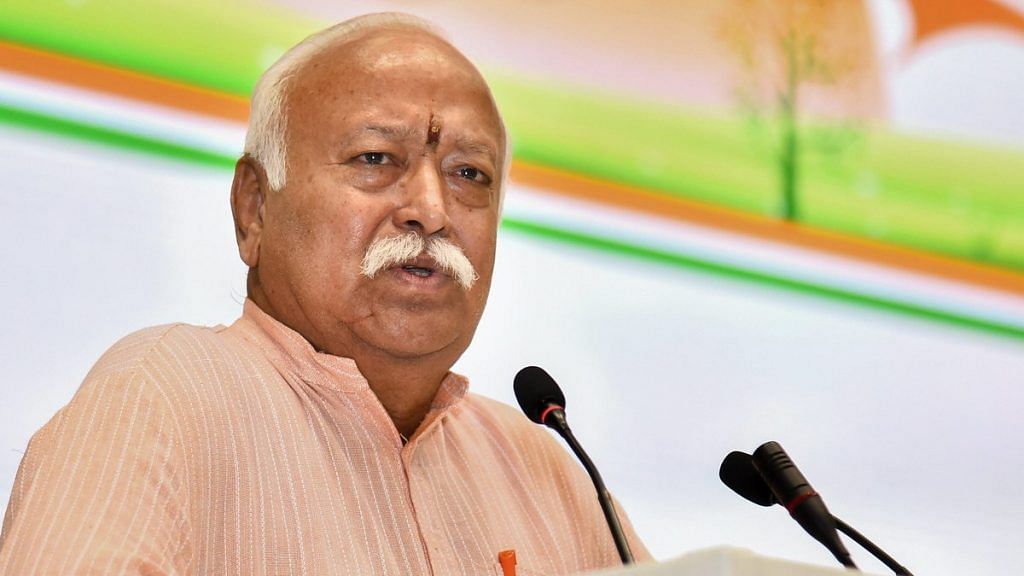Mohan Bhagwat’s lecture series has blunted the opposition to RSS.
Mohan Bhagwat’s lecture series on the Rashtriya Swayamsevak Sangh’s vision for the future is not a new thing. Such outreach efforts allow the organisation to blunt the opposition to it and strengthen its support base.
It all began with the invitation by the RSS to former president Pranab Mukherjee to be the chief guest at the concluding function of its third year camp in Nagpur. Amid protests from friends and foes alike and sharp advisory from his party members, Mukherjee accepted the invite and spoke his mind at the event. And, both the RSS and Mukherjee emerged winners.
Last month, well-known industrialist Ratan Tata shared the stage with the RSS sarsanghachalak at a function in Mumbai. And now, the RSS reached out to some of the opinion-makers of the country again, making it amply clear that its outreach programme is not to recruit blind followers but to put forth its views convincingly.
Also read: In RSS chief Mohan Bhagwat’s words lie the BJP’s 2019 campaign
Many political parties, including the Congress, boycotted the event. Even a cursory look at the statements from the top leadership of the RSS would indicate why the Congress was wrong in boycotting the RSS event.
Some time back, the sarsanghachalak, much to the discomfort of the BJP leadership, had inveighed against the BJP’s “Congress-mukt Bharat” slogan saying the RSS does not believe in this.
At the recently concluded RSS conclave, Bhagwat reiterated that RSS founder K.B. Hedgewar was also part of the Congress freedom movement, and recalled the contribution of the Congress towards the freedom struggle and social reforms.
Former RSS leaders’ praise for Indira Gandhi for her bold initiatives during Bangladesh liberation, adopting ‘soft Hindutva’ approach and taking a tough stand against terrorism are in public domain.
After losing electoral battles against the BJP, the Congress, the only other party with a pan-India appeal, is looking for opportunities to effect a course correction in its image. The Congress backroom boys in the election war room are busy strategising how to project a “Hindu-friendly” face of the Congress through its “janeu dhari” and Kailash Mansarovar-returned leader. The boycott of the RSS invitation has added no great value to the Congress’ strategy, but only robbed it of another opportunity to reach out to a wider voter base.
Also read: Rahul Gandhi has finally taken the right decision by staying away from RSS event
Since its foundation, the RSS has believed that politics and political activities are not the be all and end all in a society. However, critics will quickly point out the irony that the RSS draws maximum attention whenever there is a BJP government at the Centre or when the BJP’s political fortunes are on the rise.
Notwithstanding the claims by the RSS that it has no political front and that the BJP (founded in 1980) is not the political outfit of the 93-year-old organisation, the perception that the fortunes of the two organisations are intertwined is inevitable.
But irrespective of the criticism, the RSS has been steadfastly going about increasing its presence. The number of the RSS shakhas, the real barometer of its strength, has been consistently increasing in spite of hostile governments at the Centre or in some states. The organisation is probably stronger in Kerala where maximum violence is being allegedly perpetuated on its cadre.
Through its three-day interaction event, the RSS has successfully put forth a new set of socio-economic agenda in the public domain.
By picking up the gauntlet thrown by the RSS, the parties opposed to the RSS/BJP combine could have engaged with their ideological adversary in public and probably scored a victory of sorts. These parties could have registered their presence and may be, agreed on the need to develop a common national agenda for all-round development sans parochialism and divisive politics, as articulated by Mohan Bhagwat.
By doing so, the Congress could have been on the right side of the RSS on issues of national importance but at the same time reserved its right to disagree with the RSS on contentious issues.
The strength of the RSS – dedication, selfless workforce fired with a missionary zeal, strong and deep roots in traditions, values and principles, and a time-tested working mechanism like shakha – is a veritable asset to any political dispensation that wants to translate its manifesto into reality.
Although the RSS has studiously kept itself out of any political activity, it is not averse to sharing its strength with political parties or anyone willing to make use of the organisation’s strength and acumen for the positive good of the society.
Also read: Mohan Bhagwat says no Hindu Rashtra without Muslims: Is RSS changing before 2019 polls?
By spurning the invitation of the RSS for a dialogue, the Congress leadership and Rahul Gandhi have displayed their myopia and intolerance and lost an opportunity to forge a common developmental agenda for the nation.
The author is former editor of ‘Organiser’.
